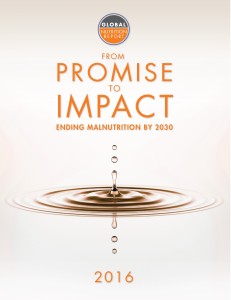 This week is the Global Launch Week for the 2016 Global Nutrition Report From promise to impact: Ending malnutrition by 2030. Various launches in Johannesburg, Nairobi, New Delhi, Stockholm, and Washington, D.C. were held on June 14. The launches in New York and Beijing are scheduled for June 16 and June 17, respectively. This year's report presents new data on countries' progress against the World Health Assembly Goals for 2025 (WHA 2025). Particularly, the report focuses on the theme of making--and measuring--SMART commitments to nutrition and identifying what it will take to end malnutrition in all its forms by 2030. Since its first edition in 2014, the Global Nutrition Report has been supporting countries in addressing and measuring malnutrition, and has been creating a culture of accountability in achieving nutrition security.
This week is the Global Launch Week for the 2016 Global Nutrition Report From promise to impact: Ending malnutrition by 2030. Various launches in Johannesburg, Nairobi, New Delhi, Stockholm, and Washington, D.C. were held on June 14. The launches in New York and Beijing are scheduled for June 16 and June 17, respectively. This year's report presents new data on countries' progress against the World Health Assembly Goals for 2025 (WHA 2025). Particularly, the report focuses on the theme of making--and measuring--SMART commitments to nutrition and identifying what it will take to end malnutrition in all its forms by 2030. Since its first edition in 2014, the Global Nutrition Report has been supporting countries in addressing and measuring malnutrition, and has been creating a culture of accountability in achieving nutrition security.
MOTIVATION
Malnutrition is a global problem with 2 billion people experiencing micronutrient deficiency, 161 million children under five suffering from stunting and 51 million from wasting, and nearly 2 billion adults obese. These staggering conditions have severe consequences for the ability of individuals, the economy, and society to thrive. To provide an accurate overview of the global state of malnutrition, IFPRI and its partners collaborated and published the inaugural Global Nutrition Report in 2014, with updated reports released in 2015 and 2016. This report represents a first-of-its-kind succinct review of global nutrition information that highlights progress in combating malnutrition, identifies bottlenecks and gaps, and proposes ways to address them.
RESULTS
The 2014 report, launched at the Second International Conference on Nutrition (ICN2), provided a comprehensive account of the global state of malnutrition. Undeniable evidence revealed that the world was off-course for meeting the WHA 2025. The measures and evidence presented by the report helped spark increased commitment to reduce malnutrition and build accountability. The 2015 report updated the inaugural report and examined the factors contributing to the notable progress made in reducing undernutrition. SMART commitments to nutrition and its importance to tackling all forms of malnutrition are the focus of the 2016 report. The Global Nutrition Report is supported by the Bill & Melinda Gates Foundation, the CGIAR Research Program on Agriculture for Nutrition & Health, the Children’s Investment Fund Foundation, the European Commission, the Governments of Canada, Germany, and the Netherlands, Irish Aid, UK Department for International Development, US Agency for International Development, and 1,000 Days.
OUTCOMES
- Both published reports have been widely cited around the world. As of March 2016, the 2014 report had been downloaded 51,168 times and the 2015 report had been downloaded 11,212 times, making the combined reports the most downloaded publication on the IFPRI website.
- Compelling evidence presented by the reports on the lack of progress against malnutrition spurred stakeholders to strengthen their commitments and develop solutions. In June 2015, G7 leaders stated in a Declaration that they will "improve the data input for monitoring [the] goal regarding food security, and in particular nutrition, by working closely with the UN bodies, the Global Nutrition Report and the Scaling Up Nutrition (SUN) Movement."
- In the two years since the first report’s release, governments and international organizations used the reports to inform their strategies. The United Nations Global Nutrition Agenda, released in 2015, identified strategic priority outcomes "based on a review of global commitments and goals, and recommendations in the 2014 Global Nutrition Report." The United States Agency for International Development’s Multi-Sectoral Nutrition Strategy 2014–2025 Technical Guidance Brief drew from the 2014 report to inform its strategies on nutrition-specific interventions and child and maternal mortality.
- The reports’ comprehensive measures of nutrition helped promote a culture of accountability. In February 2015, the then-interim SUN Movement Coordinator stated that the report is one of the important advances in the fight against malnutrition because it creates a standard measure for evaluating progress. In its October 2015 issue, the journal Food Security concluded that IFPRI’s flagship reports, including the Global Nutrition Report, are thought–provoking, pragmatic resources that contribute to holding policy makers and donors accountable for the outcomes of their policies.
- At the SUN Movement Workshop, "Tracking of Nutrition-Relevant Budget Allocations," held in April 2015, leaders agreed that the Global Nutrition Report is crucial in providing reliable data for nutrition-relevant budget allocations. Evidence from the report helped policy makers agree that nutrition is one of the most important, cost-effective means of advancing human well-being and should be made a top priority.
For more information on IFPRI's work in partnership with the EC, please go to this brochure.


